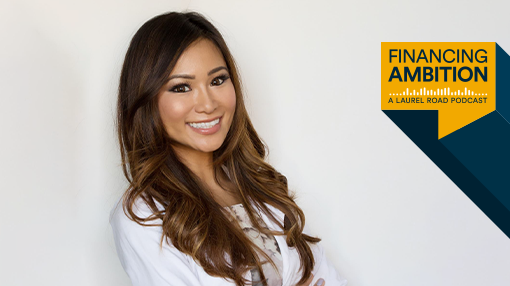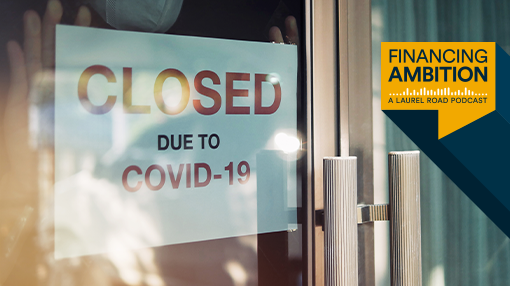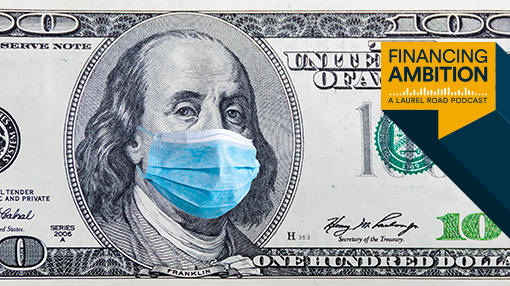Dr. Jennifer Tsai on the Personal and Professional Impacts of the Pandemic
Season 1, Episode 7 Listen to Dr. Jennifer Tsai, optometrist and social media influencer, talk about her experience opening a...

Hosts:
Laurel Road's Briarley Laban and Alex Lawrence
Guests:
Dr. Jennifer Tsai
Season 1, Episode 7
Listen to Dr. Jennifer Tsai, optometrist and social media influencer, talk about her experience opening a new practice during COVID-19, how she has been affected by racism towards Asian-Americans, and how physicians can build their “digital resume” to attract new customers via social media.
Transcript
Alex Lawrence [00:00:08] Hey, everybody, this is Alex.
Briarley Laban [00:00:09] And I’m Briarley, and you’re listening to Financing Ambition,SM a Laurel Road podcast.
Alex Lawrence [00:00:15] We’re very excited to welcome Dr. Jennifer Tsai, an optometrist in New York City who is opening her own boutique optometry studio, Line of Sight, in downtown Manhattan.
Briarley Laban [00:00:25] She’s here to talk about what it’s like to own, operate, and manage your practice during a pandemic. Along with insights into her finances and personal experiences.
Alex Lawrence [00:00:35] So, Jennifer, welcome, thanks for being with us today. Could you tell our listeners a little bit about your background?
Dr. Jennifer Tsai [00:00:42] Yeah, of course. I am a practicing optometrist in New York City and the founder of a cultural practice called Line of Sight, as well as the e-commerce eyewear line called Carrot Eyewear.
Briarley Laban [00:00:53] So take us back to the start, how did you get into optometry?
Dr. Jennifer Tsai [00:00:57] I got into optometry, I think starting in college, I knew I wanted to be in the medical field where I was helping others, but I couldn’t quite figure out exactly what specialty. And I found out that I had a retinal detachment. For those of you who don’t know, that’s actually quite serious. That means the retinal tissue inside the eyes, a layer of it has come off. So obviously that was really concerning and I was very scared. But I noticed that the optometrist who saw me, she was very compassionate and very empathetic. And it made me realize, you know, it might be a good career path to sort of see if I enjoyed it.
Briarley Laban [00:01:39] So when the coronavirus first hit New York and the state was put on PAUSE. What happened? How did that impact your business?
Dr. Jennifer Tsai [00:01:48] You know, one of the biggest things that we ran into in the beginning when I COVID first occurred in March was figuring out what I think because no one really had or knew the right answers. And I think there was really a lot of conflicting information from governors and from the state and nationally what’s allowed to be open, what you can do or can’t do. We decided to just close it and figure out what to do with permitting and construction after we received more information.
Briarley Laban [00:02:18] WOW, that must have been extremely stressful. So what have been some of the ways that you have pivoted your business to face these challenges?
Dr. Jennifer Tsai [00:02:27] I mean, I just think as a business owner, you never stop learning and you never stop growing. And I think that’s what I partly enjoy. I do enjoy challenges and finding ways to solve them. And just really adapting to technology very early on I think it has helped at least maintain a momentum. And one of the things is finding a way to see patients during quarantine and definitely set that up as soon as possible within the first week or two of quarantine. A way to do telehealth.
Alex Lawrence [00:02:56] I want to get into the specifics for some listeners about how you make telehealth really work as effectively as going to the doctor physically.
Dr. Jennifer Tsai [00:03:05] I think within the first week or two, I honestly didn’t know what I was doing because I never researched this before. It wasn’t even something I thought about it, let alone I was already preoccupied with how to build a practice and how to get patients in the door when we first opened and plan a grand opening and setting all up. So I had to kind of drop that for like a week or two just figure out this other way to see patients. And I tried out, I would say, like three to four different technology softwares that offer telehealth and see we know what which would make the most sense. I tried a bunch out and I actually tried them out as a patient because it’s not, it’s important how it works as a health care professional, but the more important thing is what is it like on the patients’ end?
Briarley Laban [00:03:52] That is so interesting and, you know, I’ve seen a lot of different healthcare providers apply telehealth in new and novel ways over the last few months. Tell us, what does the future of telehealth look like and how do you think that you’ll be applying it?
Dr. Jennifer Tsai [00:04:09] I would say that there are definitely pros with using telehealth. I can see that it reduces chair time. A lot of visits, at least in eyecare sometimes they’re just medical follow-ups. Eventually, doing virtual fittings. That means like trying on frames in the comfort of their home and seeing how that fits in and being able to choose the correct frame for them. And also, I think for patients who just feel generally uncomfortable right now going into a public scenario. There are some cons, which is you don’t have the equipment that you need all the time. But I think it’s great for just like a fundamental checkup or, you know, a brief consultation or follow-ups as well.
Briarley Laban [00:04:54] As this pandemic continues, there are likely costs related to the business. Have you been able to take advantage of any of the government programs to assist with these expenses?
Dr. Jennifer Tsai [00:05:05] It was tough for me to get the loans in the beginning just because it went to a lot of larger corporations that had more employees. Their payroll was higher, you know. And so, unfortunately, it wasn’t able to get the PPP. But eventually, I was able to give EIDL. I also looked into a lot of sorts of grants and I looked at a few woman business owner loans. There’s also a minority business owner loans and also local community grants in your state. So just everyone’s been very helpful with each other and knowing that the interest rates are quite low for a period of time if it’s something that you need, I would seek it.
Briarley Laban [00:05:47] Yeah, absolutely. It’s actually so great to hear that you’ve found a solution and its really great to know that there are programs our there to help small businesses like yours. How have you been able to manage your personal finances at this time? Do you have any tips?
Dr. Jennifer Tsai [00:05:58] It’s really important to have savings in place because I don’t think anyone predicted this at all. And this is something where if it’s extended three months of time of not work and if you didn’t have any savings going in, I can imagine how stressful that could be. Aside from that alone talk, you know, finding a way to delay rent if you can talk to your landlord. I’ve heard that many people were able to find a way to delay their rent. A lot of landlords for very understanding with that. Finding ways to delay utilities. I think in terms of loans, there’s definitely been things like refinancing your student loans. I have student loan debt from graduate school and, you know, I refinanced my loans. I use Laurel Road and that’s been helpful with lowering of rates and things like that and just recalculating your finances to see where you can reallocate your money where it’s needed.
Briarley Laban [00:07:02] Dr. Tsai, we have seen in the headlines that there has been a lot of discrimination around Asian-Americans during the pandemic. Can you share more about your experience?
Dr. Jennifer Tsai [00:07:13] Very happy to talk about this. And it’s something that took me, I would say, some time to process myself before feeling comfortable with it. Sometimes these things, it’s like a shockwave and you have no idea how it’s going to impact you because, you know, you’re dealing with one thing which is your own fear of COVID, and then another, which is racism. And it’s just a very anxious and I think it adds more stress in terms of, you know, mental health and anxiety. But it’s very important I decided, you know, it’s really important to share this with others because you want to share experiences in case other people are going through similar situations and maybe are too afraid to speak up about it. And also, we see about Black Lives Matters and the protests. And so I think with COVID it’s definitely shed a light on the structure, I think, of our society and what it’s built on. And I think that maybe we swept under the rug that we’ve never really talked about, that we kind of just dealt with subconsciously and over years. And so, you know, living in New York, I can tell you that New York has always been a melting pot. And it was never painted it as a picture where people were racist and that there was bigotry. So, yeah, you know, personally, around the time of I think when it first started, I remember there was one time when I was walking to see patients, to go to work, a person on the street called me a chink in and tried to spit on me. And I was completely shocked by that. And I wanted to have a, I guess, rational discussion with the person. But, you know, I realize, you know, this is a bigger issue and talking to one person isn’t going to change, you know, what’s going on in America. And I think, you know, that situation really escalated when it was being called the Chinese virus by politicians. And I think I also would go on the news and I would see local hate crimes occurring across America. Even in my area, young professionals where I lived, on my street were actually getting punched while they were walking to work. And I think it just really escalated hate crimes and it wasn’t really addressed again and it was against swept under the rug. It was never an excuse for bigotry. And I don’t think xenophobia is, you know, a great way to combat COVID. And the virus does not discriminate by race. Looking back, I will admit it was definitely hurtful. And at a point in time, I may have felt ashamed and it shouldn’t be that way. And I know that others may have felt that way in the beginning. And it was more so just being scared about being outside like I did not feel comfortable normally when I did walking to work and in broad daylight. And I think that also made it more confusing as a health care professional because I am going to work to help others. I try to focus on the bigger picture, which is how can I create change with the platform that I have? And that’s by educating. By educating how coronavirus spreads and educating how you prevent yourself from getting it and how you can protect yourself and practice hygiene, instead of focusing on the fear or spreading hatred.
Alex Lawrence [00:10:34] Thank you so much for sharing those personal stories. And I’m sure many, many people can relate to the experiences you’ve had. How do you take care of yourself as a doctor during these times? How do you prioritize your mental health?
Dr. Jennifer Tsai [00:10:52] You know, during the time period, I definitely felt everything from fear, anxiety. There were moments of happiness and joy then I would go back down to sadness and just uncertainty about the future. But I think that what is helps is understanding that it’s not just us. You know, our colleagues are going through the same. It’s nice to know that you have shoulders to lean on. Maybe other business owners that you know of or colleagues of yours that you can talk to about this and you know that they’re going through the same. And I think that becoming aware of how I was feeling was important to start with because you really can’t address something that you choose to ignore. And based on personality and just as a business owner, I’m used to just sort of holding emotions. But I think that during this time, I allowed myself to really feel them because that’s how you eventually let them pass. And by learning and acknowledging them, I think you’re able to address them head-on. And I think it’s normal to know that it’s OK to feel that way and it’s OK to not be OK.
Briarley Laban [00:12:07] So, Dr. Tsai, what are you doing to really prioritize during these times?
Dr. Jennifer Tsai [00:12:12] What’s helped me is I focused my energy on myself, which is finding renewal in my passions in meditation, and journaling, and yoga, and doing a lot of exercise with, I got a Peloton, and cardio, learning new cooking recipes, it’s something I haven’t done in a while, and to taking classes that they offer online through these programs, and learning on webinars, and staying in touch with friends and family. Just being present I think has been helpful, you know, to not be hard on yourselves now that you’re you know, you’re not just slacking off, working at home. It’s OK if you just have a day where you’re just, I think, you may feel guilty like you’re just doing nothing or you just have a lot to deal with. You just want to relax. But, you know, you’re at home working during a crisis. And it’s not, you.
Alex Lawrence [00:12:58] Yeah, great advice. I think a lot of people have a hard time taking time off in the same sort of way now that many people are working from home.
Dr. Jennifer Tsai [00:13:07] Yeah. And I think I think it does help when some you know, for me, I actually there are moments in time when I put my phone away. I turn it off and that’s my pause for the day. And I think you you need to pause. For some others, they maybe like having two phones. One is a personal, one is their work phone. Two separate laptops. Just maybe it’s just the mindset of being able to separate or having a separate room where it’s just specifically for work. I think it creates a mental barrier and I think it helps people set boundaries, which is important.
Alex Lawrence [00:13:40] Last question. How do you use social media as a health care practitioner to reach your patients in this day and age? And I know that you’ve had some success in that medium, and I would love to hear how you got started. And what are your tips for medical practitioners specifically using social media to reach their patients might be?
Dr. Jennifer Tsai [00:14:02] I think I’m during this time it’s definitely shed a light on the importance of just a digital presence. That’s the best way to put it. Obviously, stores are all completely closed for months and everyone was spending all of their time on a computer. I think our usage on our site, I think I checked mine, it went up like three times the amount. So, you know, having a social media presence is really important in our day. I think a lot of people, especially in the younger generation, they find everything that they need on the phone. And it takes only a minute to really just type in a doctor. And I call it a digital resumé. We know exactly where you went to school, you know, what your credentials are, where your office is, and what specialties you offer. We can read your reviews. We know your bedside manners we can even tell what kind of personality you have by your social media. And, you know, are you passionate about what you do? Are you, you know, informed and educated? So I think these are all really important factors to take advantage of being able to reach others and patients that way.
Alex Lawrence [00:15:09] Now, Dr. Tsai, I’m loving your Instagram channel. You know, I think it really shows your personality, your love for what you’re doing, but also your authenticity. Can you share some specific ways that you’ve been able to create content that is valuable to your audience?
Dr. Jennifer Tsai [00:15:27] In the beginning, before stores were opening, it was showing how you can educate others about COVID and how it is spreading. And I decide to start sharing and just researching and learning about tips about how does, how do we prevent spreading infection by touching our glasses all the time and putting it down and not realizing that this is a method of contamination. And then I found ways to educate others on how to clean your glasses properly at home. And, you know, how do you wear a mask and prevent it from fogging up your glasses was another big one that I think from a lot of success. So it really is just to provide free education for others. You know, valuable information that people can take and I think is just when others realize that, they recognize that maybe now you’re really passionate about what you do and you care about others and it helps them patients want to come see you. And I think when the store reopens, it’s important for offices to show that they are implementing the right protocols to make patients feel safe, including sterilization, and social distancing in offices, and things like that. And sharing that with patients, because I think patients do look it up and they check twice before coming in to make sure that they feel comfortable.
Alex Lawrence [00:16:35] Thanks so much for sharing your personal story and your professional challenges and successes during this time with us today, we really appreciated learning from you. Thanks again for being here.
Dr. Jennifer Tsai [00:16:45] Thank you so much for having me.
Alex Lawrence [00:16:47] Our pleasure.
Briarley Laban [00:16:49] I’m so grateful for Dr. Tsai for being available to us to share her perspective today.
Alex Lawrence [00:16:56] I agree it was great to hear her perspective and how agile she’s been able to be during such a challenging time and making the transition to telehealth and video conferencing work for all her clients and also how she’s leveraged social media to market herself during this time. It’s nothing short of really impressive what she’s been able to do.
Briarley Laban [00:17:17] Absolutely. And, you know, I have had quite a bit of experience, particularly in the last few months, learning about how optometrists have been dealing with the current situation through our partnership with the American Optometric Association. And I know from working with this association that optometrists have really been hit hard with the pandemic. So I really admire what she’s been doing to turn her business around and to pivot into to pursue new avenues to really keep things going.
Greg Fullum [00:17:53] And now for the legal. Any opinions, findings, and conclusions expressed in this podcast are those of the participants and do not necessarily reflect the views of KeyBank in providing this information, KeyBank is not acting as your agent or is not offering any tax, financial, accounting, or legal advice. Our guest, Doctor Jennifer Tsai, is a Laurel Road customer and received compensation for her time. Laurel Road is a brand of KeyBank, N.A. Member FDIC and Equal Housing Lender. NMLS #399797.
Don’t miss the latest financial resources.
This site is protected by reCAPTCHA and the Google Privacy Policy and Terms of Service apply.
Get tailored Laurel Road resources delivered to your inbox.
Search Results


